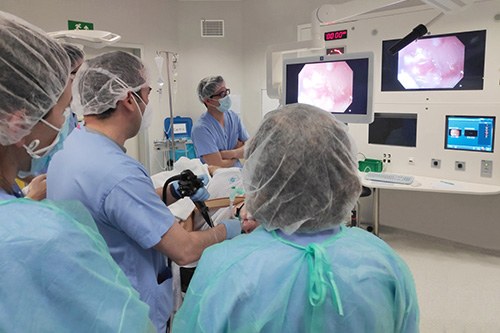The Digestology Service of the Fundació Althaia has recently introduced a new endoscopic procedure for the removal of premalignant lesions or incipient cancers of the stomach, colon and rectum. This new procedure, known as endoscopic submucosal dissection (ESD), is far less aggressive and invasive than conventional surgery as it avoids the total or partial removal of the organs involved. This new approach to early cancers has a positive effect on patients’ recovery and improves their quality of life.
Althaia is one of the first five Catalan hospitals to implement ESD, which is an alternative to conventional surgery for very superficial cancer lesions or benign lesions with a risk of progression. Therefore, early detection is essential for it to be carried out.
An important feature of ESD is the fact that the lesion is removed en bloc, i.e., in one complete piece. This allows a more precise histological analysis of the lesion, which is carried out by the Pathology Service of the Sant Joan de Déu Hospital in Manresa. The results of the pathology examination determine whether the removal has proved curative or whether other treatments will be necessary, such as surgical removal of lymph nodes, chemotherapy or radiotherapy. The stage of the lesion is also an important factor.
In all cases, decisions regarding the selection of patients for ESD are made by the Althaia Tumour Committee. This multidisciplinary body chooses the most appropriate and personalized therapeutic guidelines according to the characteristics of each case and the established protocols.

High level of specialization
On average, the surgical unit at Sant Joan de Déu Hospital in Manresa performs one ESD per month. The procedure is carried out by a team of digestologists at the institution with specifical training in this technique. Its performance requires great skill on the part of the digestologists and, for this reason, specialists from the institution have been trained at centres in the UK and Japan. The Althaia team also has the support of an expert consultant from the Germans Trias i Pujol Hospital.
The implementation of ESD is closely linked to one of the research lines of the Gastrointestinal Oncology, Endoscopy and Surgery (GOES) research group. Dr Ignasi Puig and Dr Marco Antonio Álvarez, digestologists at the institution and members of GOES, have published reference studies on the subject and have taken part in the development of international clinical guidelines that establish when ESD is indicated, with the help of optical endoscopic diagnosis and magnification. The team’s involvement in this line of research allows careful selection of patients for the procedure, bearing in mind that conventional endoscopic removal is sufficient in patients with very benign polyps.
Research and innovation in the biomedical field make possible the application of tools and treatments that improve healthcare practice. The incorporation of this new procedure for endoscopic removal of premalignant lesions or incipient cancers of the stomach, colon and rectum is one example. This has a direct impact on patients and the population in general, as they the main beneficiaries of the researchers’ work. In accordance with its 2021-2025 Strategic Plan, Althaia is committed to promoting these areas.
